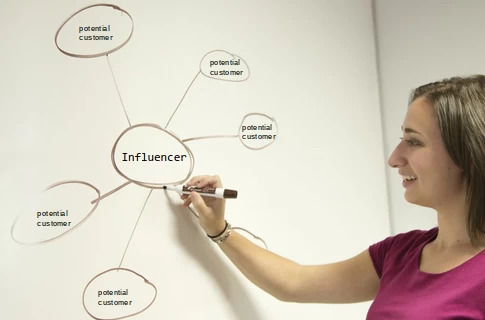Word-of-Mouth Marketing and Influencer Marketing: An advertising force worth the investment. Can Double Sales and Increase Retention by 37%.

Scott Cook, CEO and founder of Intuit, once said, “A brand is no longer what we tell the consumer it is--it is what consumers tell each other it is.” This is a lesson that every marketer and every business must absorb and leverage to their advantage if they want to succeed in the modern world of digital media.
Nowhere is the power of consumer opinion more evident than social media. Social media has become a giant water cooler where customers share their experiences with brands they have used in the past, both positive and negative. Consumers listen to these opinions. According to a McKinsey Study quoted in Forbes, word-of-mouth marketing will generate on average twice the number of sales than paid advertising and customers generally have a 37 percent higher retention rate.
For companies interested in leveraging the power of online opinions, few marketing techniques will be more beneficial than using influencer marketing to target key demographics of potential customers and growing the business.
What is an influencer?
An influencer is a person who has established themselves as an authority within a particular niche. An influencer will bring a strong following on various social platforms, but the relationship they have with these communities is much more important. These people will have their own digital presence and are viewed as extremely knowledgeable and experienced. When these people recommend a particular brand or product, their followers trust them. Influencers have a tremendous impact on the actions of their communities.

When you use influencer marketing, you build a relationship with a particular influencer to reach their audience. Since the audience has such trust in the influencer and respect for their opinion, this will improve the reputation of your brand in their eyes. This will help you boost exposure for your brand, your website visitors, and your conversion rates.
It is important to not mistake influencers for brand advocates. Brand advocates are better described as the people who have used your company in the past and love what you do. In their admiration for your organization, they will tell their networks about your company and recommend your brand to anyone who asks.
Brand advocates can be very valuable for spreading the brand, but they do not fill the same niche as an influencer.
- Their networks tend to be much more limited and overlap considerably with those you already reach
- They promote your brand out of admiration, not because of an agreement
- Although they promote you, they have less influence on the actions of others
How does influencer marketing work?
Influencers are very aware of the impact they have over their social communities and have spent effort and time establishing themselves as an authority. It can be helpful to view the influencer as a brand themselves.
Successfully leveraging influencer marketing requires building a relationship with an influencer and establishing a mutually beneficial arrangement. If you have produced a cutting edge product in your industry, for example, you can ask the influencer to promote you by giving them early access or a trial subscription. They will be happy to have the opportunity to promote new technology in the field and further establish themselves at the front of their industry and you will have an incredible advertising force. You can use influencer marketing for short-term products, such as promoting a particular paper or event, or it can be part of a long-term relationship where the influencer actively participates in promoting the brand.
Medium-sized influencers have the power to drive a considerably amount of conversion. According to KISSmetrics, 100 influencers have the power to drive one thousand actions. On social media, influencer marketing has 16x the average engagement rates of alternatives, such as paid advertising. Considering that an estimated 50 percent of purchase decisions are driven by word-of-mouth marketing recommendations, influencer marketing gives organizations the tools they need to speak the languages of their potential customers.
Consider for example L’Oreal and Michelle Phan. Phan has gained a considerably following on YouTube with several million subscribers. She has been uploading makeup videos since 2007 and has built a community and reputation as an influencer within that industry.

L’Oreal recognized her power to connect with viewers on social media and tapped into that potential by launching a mutually-beneficial product line. The company was promoted by a powerful influencer to millions of interested people while Phan was able to grow her personal brand.
The importance of context
Audience means everything when working with influencers. You have to understand your intended audience and who pays attention to the particular influencer you have in mind. A person might have millions of followers, but if those people do not fit the description of your intended audience, then the message will fall flat.
To find an appropriate brand influencer you need to consider the following factors.
- What types of social media channels does your intended audience typically follow?
- What would an appropriate influencer be discussing on their platform that would attract the right audience?
- What type of influencer do you want visual, written, or tweets?
Asking these questions will help you narrow down your search for an influencer. Use social media tools, such as Google Alerts, Tweetdeck, hashtags, blogs, and related social media monitoring to identify some key influencers who can help drive the brand forward. Once you identify the influencers, you need to establish a dialogue and rapport with them to find out what interests and elevates them. Work together to define a mutually beneficially exchange of information or access that enables them to maintain their independence and support your product, service, or brand.
The opinions of other customers now matter to consumers more than ever. Word-of-mouth marketing and consumer opinions posted online rank as two of the most trusted sources of advertising. When companies tap into the power of influencer marketing, they can inherit the trust of countless new people.
